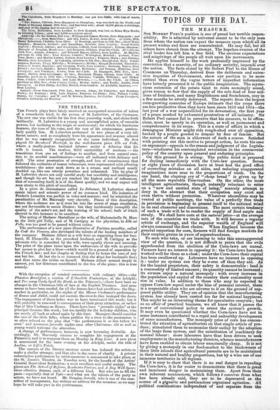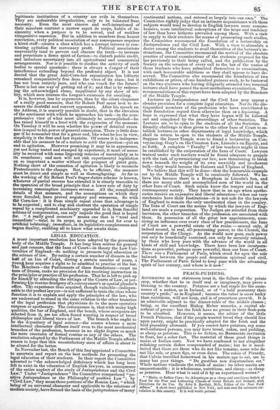TOPICS OF THE DAY.
THE MEASURE.
SIR ROBERT PEEL'S position is one of proud but terrible respon- sibility. He is admitted by universal assent to be the only man from whom the nation can expect the measure upon which all its present wishes and fears are concentrated. He may fail, but all others have shrunk from the attempt. The hopeless evasion of the rival leader has left him a free field. The anxious expectations and misgivings of the people all wait upon his movements.
He applies himself to the work profoundly impressed by the conviction that a scarcity, of no ordinary severity, impends over the nation. The facts stated by Sir Robert Peel to the House of Commons on Thursday, derived from the deliberate and exten- sive inquiries of Government, show our position to be more critical than even the vague terrors of imperfect information have latterly presented it to the public imagination. The myste- rious extension of the potato taint to roots seemingly sound, gives reason to fear that the supply of the sole food of four mil- lions of Irishmen, and many Englishmen and Scotchmen, may in a few months be utterly destroyed. The reports from the largest corn-growing countries of Europe intimate that the crops there are less productive than they have been since 1813 and 1814—the last year of a war unparalleled for its devastation, the first year of a peace marked by exhausted prostration of adindustry. Sir Robert Peel cannot fail to perceive that his measure, to be effica- cious, must be speedy in its operation, as well as permanent and comprehensive in its scope. This is a state of affairs in which a demagogue Minister might ride rough-shod over all opposition, backed by a people goaded to despair by fear of famine. But the nature of the man is abhorrent of such a course. Satisfied with pointing out this motive to prompt action, he rests his case on argument—appeals to the reason and judgment of the Legisla- ture—vindicates his contemplated revolution in the commercial policy of the country upon general and enduring principles. On this ground he is strong. The public mind is prepared for dealing immediately with the Corn-law question. Seven or eight years of discussion have at least had the good effect of correcting mistakes on all sides, and reducing exaggerated imaginations more near to the proportions of truth. On the one hand, the claptrap cry of "cheap bread" is given up by all the more reputable Free-traders. On the other, the more intelligent agriculturists, though naturally reluctant to enter on a "new and untried state of being," scarcely attempt to deny in the abstract that their occupation may exist and even thrive without protection. Whatever absurdities may be vented at public meetings, the value of a perfectly free trade in provisions is beginning to present itself to the national mind in its real character and dimensions. The most certain tendency of such a trade will be to render the supply of food ample and steady. We shall have corn at the natural price—at the average rate of the countries we trade with. It will become a regular article of exchange, and the superior wealth of England will always command the first choice. When England becomes the general emporium for corn, farmers will find foreign markets for their surplus grains in years of superabundance. To men who take, or are learning to take this unexaggerated
view of the question, it is not difficult to prove that the evils apprehended from the abolition of the Corn-laws are unreal. Farmers have no interest in opposing it : the Corn-laws have not worked well for them as a class ; under the Corn-laws their capital has been swallowed up. Labourers have no interest in opposing it : under no system can they be worse off than they are. As for the landed proprietors, their safety is demonstrable : land .&; a commodity of limited amount ; its quantity cannot be increased ; its owners enjoy a natural monopoly : with every increase in the population and capital of the country their commodity must rise in value. In addition to those who may be expected to oppose Corn-law repeal under the bias of personal interest, there is a respectable class who are adverse to it on the ground of sup- posed public utility. They are of opinion that the manufacturing system has already been carried too far for national happiness. This might be an interesting theme for speculative essayists ; but as an affair of practical business, we all know that it passes the power of conventional policy to arrest the system's growth. It may even be questioned whether the Corn-laws have not in some instances contributed to a rapid and unhealthy development of some manufactures. The monopoly price of corn has concen- trated the attention of agriculturists on that single article of pro- duce; stimulated them to economize their outlay by the adoption of the large farm system, and the substitution of machinery for manual labour : more labourers have thus been driven to seek employment in the manufacturing districts, whence manufacturers have Been enabled to obtain labour unnaturally cheap. It is not by giving a monopoly in our food-market to the landowners of these little islands that agricultural pursuits are to be maintained in their natural and healthy proportions, but by a wise use of our immense territories in all regions.
If it is easy to show that there is no real danger in repealing the Corn-laws, it is far easier to demonstrate that there is great and imminent danger in maintaining them. Apart from their own inherent noxiousness, which follows d conuerso from what has been already said, they are to be deprecated as the source of a gigantic and pertinacious organized agitation. AU political combinations independent of and separate from the
legitimate institutions of a country are evils in themselves. They are undesirable irregularities, only to be tolerated from necessity. Even the most sincere and well-intentioned of their members contract a narrow esprit de corps, habits of in- sincerity when a purpose is to be served, and of reckless vituperative aspersion. But in addition to members from honest conviction, every political association of any consequence requires a hired staff—creates a class which has a corrupt interest in con- tinuing agitation for mercenary profit. Political associations unavoidably tend to pervert and obscure the truth—to increase and perpetuate a fierce spirit of faction—to disturb public credit, and introduce uncertainty into all agricultural and commercial arrangements. Nor is it possible to confine the activity of such bodies to special questions : there is always a danger of their interference extending beyond the professed object. It is not denied that the great Anti-Corn-law organization has hitherto remained comparatively free from the vices of its class; but it has not been entirely pure, and who can vouch for the future? There is but one way of getting rid of it ; and that is by redress- ing the acknowledged abuse, unpalliated by any show of uti- lity, which men tolerate the League's existence fur assailing. It is, however, less by arguments, than by the silent eloquence of a really good measure, that Sir Robert Peel must look to re- assure the doubtful and convert. opponents. After his speech on the Address, it is scarcely possible to doubt, that in the elevation of the sentiment with which he approaches his task—in the com- prehensive view of what must ultimately be accomplished—he has raised himself to a level with the exigencies of the moment. On Tuesday it will be seen whether his power of detailed execu tion is equal to his power of general conception. There is little dan- ger if he remember that for a great end, like what he has in view, sunplieity is the first and last requisite. Of course it is indispens- able that his measure be of a nature to settle the question—put an end to agitation. However promising it may be in appearance, yet not being tested and stamped by experience, it must of neces- sity be received with some lingering remains of uncertainty as to its soundness ; and men will not risk experimental legislation on so important a matter without the prospect of great gain. Nothing short of the cessation of agitation is likely to reconcile Protectionists to the change. But, to be efficient, the measure must be direct and simple as well as thoroughgoing. As far as the working of Sir Robert Peel's Sugar-duties scheme is known, whatever of partial success has attended it is clearly traceable to the operation of the broad principle that a lower rate of duty by increasing consumption increases revenue. All the: complicated details of that measure, and the assumptions on which they were founded, have proved nugatory and erroneous. So with the Corn-law : it is from simple repeal alone that advantage is to be expected ; and to clog and obstruct the operation of simple repeal by a complicated machinery appended to it, from fanciful notions of compensation, can only impede the good that is hoped for. " A reallygood measure means one that is " total and immediate"—total, in its scope, as putting an end for ever to artificial bolstering; immediate, in its legislative completeness and begun finality, enabling all to know what awaits them.



























 Previous page
Previous page